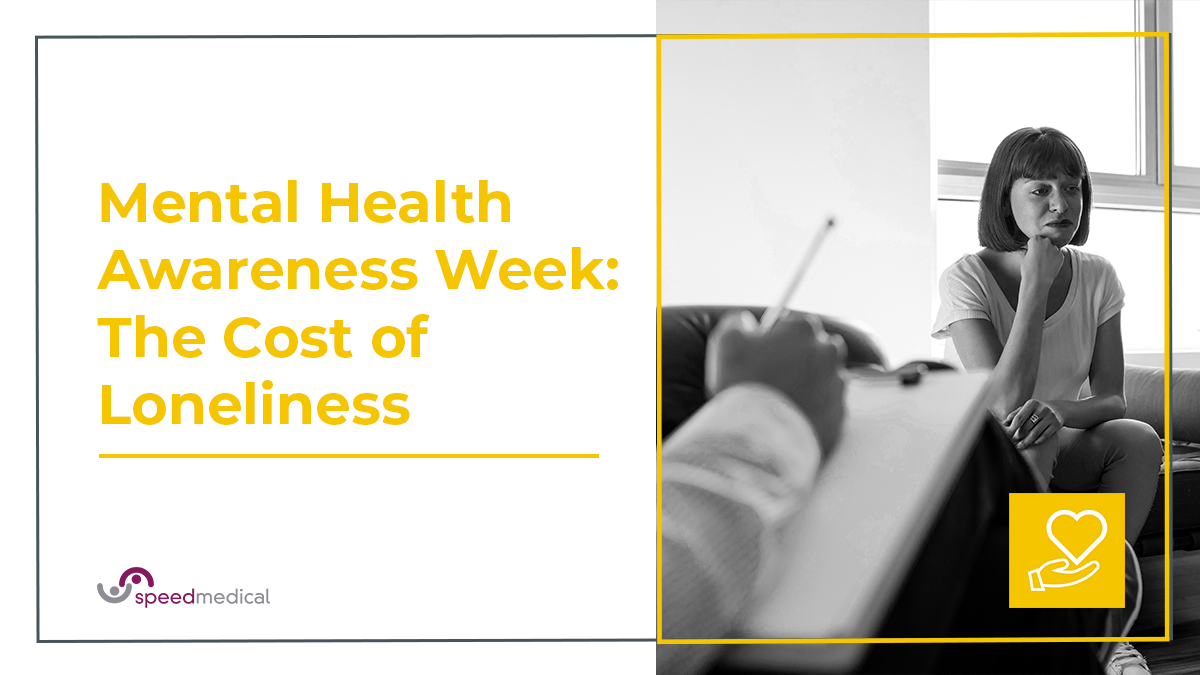
10 May 2022
Mental Health Awareness Week: The Cost of Loneliness
Mental health awareness week began on May 9th and this year’s theme is loneliness. During the pandemic, words like ‘lockdown’ ‘social distancing’ ‘isolation’ and ‘quarantine’ quickly became part of our everyday vocabulary, but the meaning behind them was something far more difficult to come to terms with.
“Loneliness affects many of us at one time or another. We know that loneliness can be both the driver for and a product of poor mental health,” says Mental Health UK. “The pandemic has given rise to a sense of loneliness and isolation undermining confidence in daily routines. In recent times, many of us have had far less access to loved ones.”
Not being able to spend time with family and friends or colleagues was one of the biggest challenges we faced during the pandemic, and it put a spotlight on the true cost of loneliness and social isolation. We’d never been in a position where so many people were completely alone, and we saw just how damaging it can be. “Loneliness is something that we all feel at times but when it is chronic or long-term it can have serious effects on our mental health,” says the Mental Health Foundation.
What is Loneliness?
Loneliness can affect anyone and isn’t always necessarily linked to being or living alone. “Loneliness is not always the same as being alone… you may have lots of social contact, or be in a relationship or part of a family, and still feel lonely – especially if you don't feel understood or cared for by the people around you,” explains mind.org. Although loneliness in itself isn’t a mental health problem, the two are very much linked and feeling lonely can have a huge impact on mental health.
“Reducing loneliness is a major step towards a mentally healthy society,” says Mark Rowland, Chief Executive of the Mental Health Foundation. “Our connection to other people and our community is fundamental to protecting our mental health so we much find better ways of tackling the epidemic of loneliness.”
How Damaging is Loneliness to our Health?
According to the National Library of Medicine “Loneliness can lead to various psychiatric disorders like depression, alcohol abuse, child abuse, sleep problems, personality disorders and Alzheimer’s disease.” There is also a physical toll that loneliness can take on our health. “It also leads to various physical disorders like diabetes, autoimmune disorders like rheumatoid arthritis, lupus and cardiovascular diseases like coronary heart disease, hypertension (HTN), obesity, physiological aging, cancer, poor hearing and poor health.”
With strong links to both mental and physical poor health, it’s hugely important that loneliness is openly talked about and that anyone suffering knows that help and resources are available.
Forming Meaningful and Healthy Relationships is Key
A document released by the Mental Health Foundation gives us an in-depth look at the importance of making and maintaining healthy relationships in our lives. The report begins by reminding us how often we are told to eat right, drink in moderation, and not to smoke, but how public messaging about ensuring we have healthy relationships in our lives is basically non-existent. “Relationships with the people we love are the foundation of our lives. However, the significance of our relationships extends beyond how they affect our emotional wellbeing. The evidence is clear that the quality of relationships even affects how long we live,” the report states.
Talking Helps
The first piece of advice the NHS offers to people struggling with feelings of loneliness is to “try talking about your feelings to a friend, family member, health professional or counsellor.” Talking is only ever going to help, even if it doesn’t feel like it at first. A big problem with loneliness is that it’s often cyclical – feeling lonely can affect your mental health and lead you to shut down, and having poor mental health can make you feel lonely. Often those suffering with their mental health can become antisocial and closed off to those around them, exacerbating feelings of isolation and loneliness.
How Can You Help Your Employees?
Mental health issues were the primary reason for staff needing to take time off of work, according to a report from GoodShape. A huge 19% of all lost working time in 2021 was down to poor mental health across all sectors.
Speed Medical can help with employee mental health and wellbeing through a panel of occupational health practitioners, counsellors, psychologists, and psychiatrists who can provide a whole range of services. We will be there for your business, and every single staff member, throughout any medical journey. Your team can rely on us to ensure they get the best help possible, quickly, and in a place that’s convenient for them.
Please get in touch today to learn more or to talk to a member of our team.






